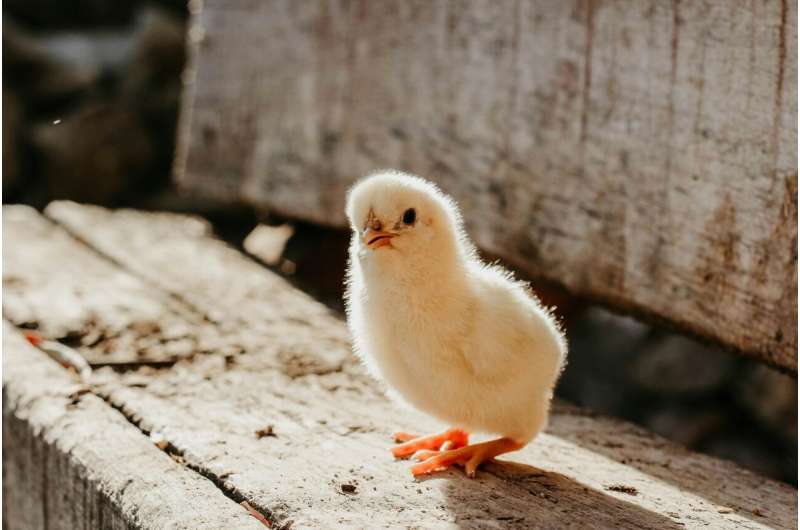This article has been reviewed according to Science X's editorial process and policies. Editors have highlighted the following attributes while ensuring the content's credibility:
fact-checked
trusted source
proofread
Patented probiotic spray method improves hatchability, health of chicks

Mary Anne Amalaradjou, associate professor of animal science in the College of Agriculture, Health and Natural Resources, has found that using a probiotic spray on eggs improves the number and quality of chicks that successfully hatch.
The study is published in the journal Poultry Science.
Amalaradjou patented a method of spraying eggs with probiotics shown to improve embryonic development and post-hatch growth of chicks raised for broiler production. This method improves chick health without relying on antibiotics, which are increasingly banned due to the rise of antibiotic-resistant bacteria—a threat to human and animal health.
In her latest study, Amalaradjou wanted to look at the hatching stage itself.
"We never looked at the in-between window of the actual hatching process so in this study we decided to focus on that," Amalaradjou says.
This is especially relevant as there has recently been a drop in hatchability, defined as how many chicks successfully hatch from the group of eggs put into an incubator. Scientists do not yet know what could be responsible for this drop.
Amalaradjou observed that when the eggs were sprayed with probiotics, there was an approximately 5% increase in hatchability. The hatchlings were also healthier and more active.
Amalaradjou and her team scored the chicks according to qualitative criteria used by the industry. These criteria include how quickly a chick can stand up after being put on its back; if its naval is fully sealed; if its eyes are open and active; having well-formed legs; inflammation in the hock joint, which the chick uses to crack its egg open; and if it has ingested too much of the egg yolk before hatching.
"They were all scoring very well," Amalaradjou says. "There was a significant difference in the quality of the chicks from the probiotic group compared to the control."
Following this study, Amalaradjou and her group will simulate the transportation process to see how chicks from eggs treated with the probiotic spray fare.
After they hatch, chicks raised for broiler production are soon transferred to a farm where they grow out. This transfer is often across long distances and the chicks must endure it without food.
"The hatching process by itself is very stressful," Amalaradjou says. "They have to use up all their energy to hatch out and then they have no feed for 48 to 72 hours."
If the chicks are weak when they hatch, there's a high chance they will die during or shortly after the transfer. Amalaradjou hypothesizes that the probiotic spray will give them a leg up in surviving this stressful event as these chicks have proven to be healthier than those in the control group in every other stage. Amalaradjou will also look at how these chicks grow after transport.
"We want to figure out if the improvement we see actually translates into reduced mortality of the birds," Amalaradjou says. "And then we want to see what happens to them when they grow out—do they make more muscle, more meat? That's the next step because at the end of the day it's how much meat the birds can make in the case of broiler chickens."
More information: Mairui Gao et al, In ovo probiotic supplementation supports hatchability and improves hatchling quality in broilers, Poultry Science (2024). DOI: 10.1016/j.psj.2024.103624
Provided by University of Connecticut





















